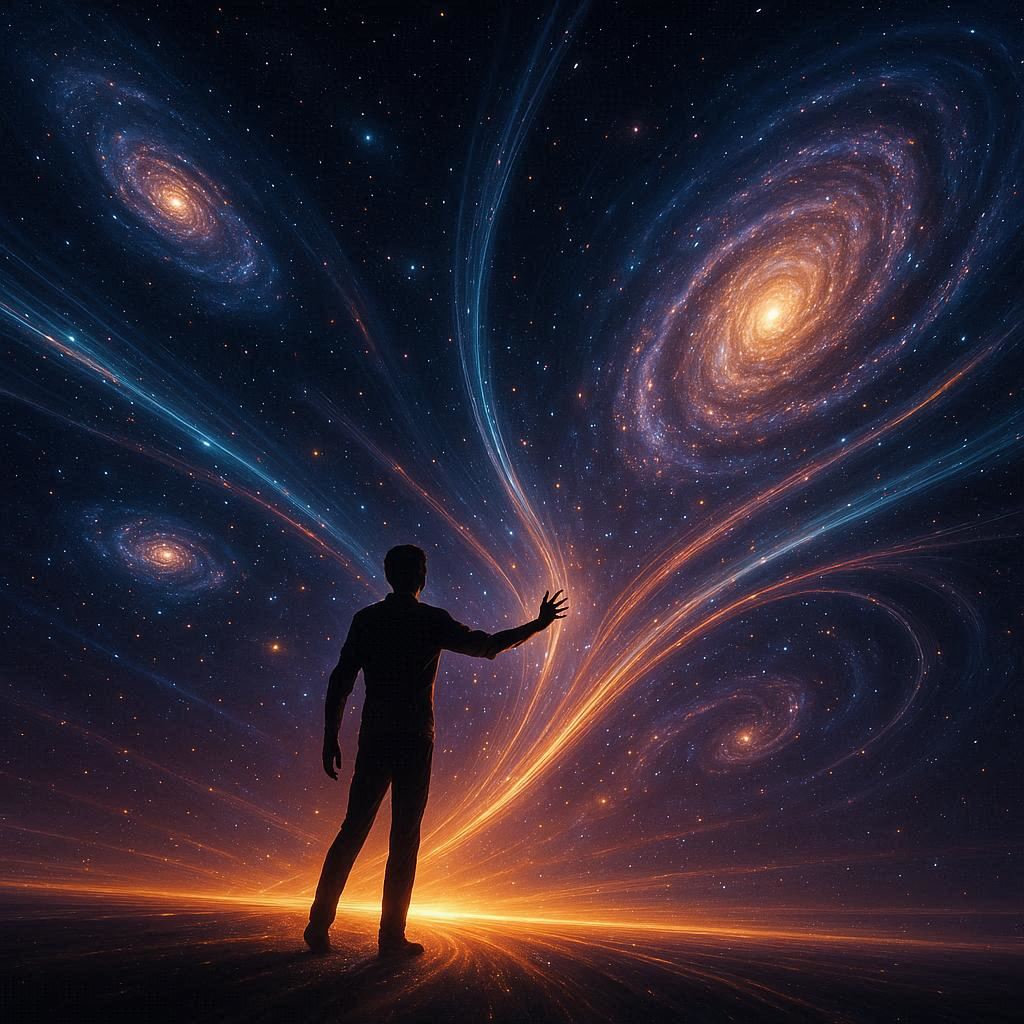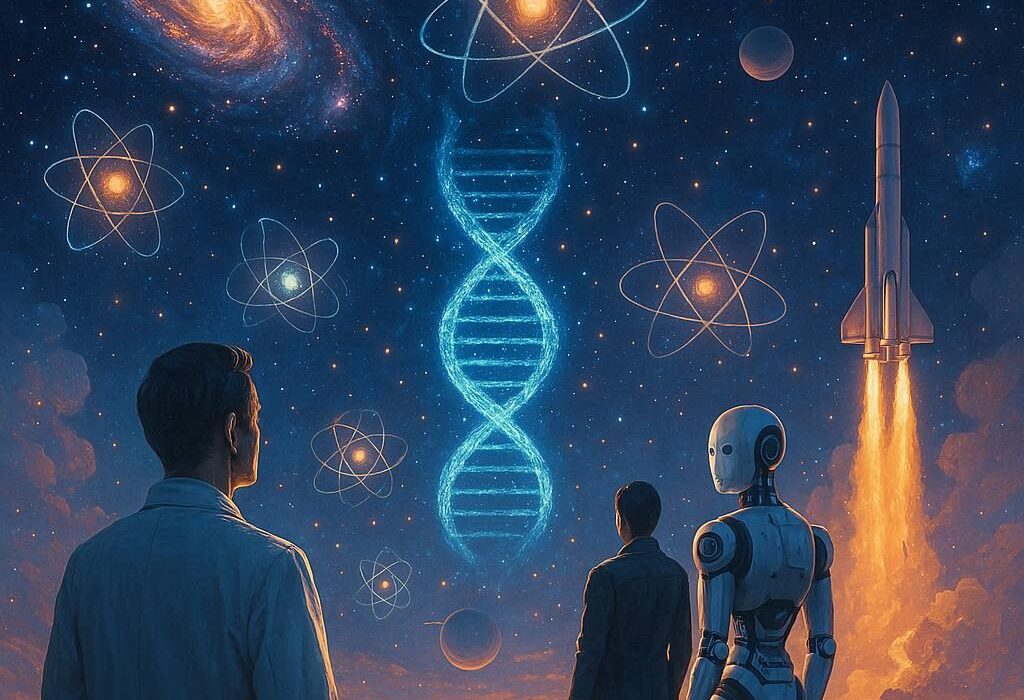From the moment the first humans gazed upward at the night sky, a single question has burned at the heart of our existence: Are the rules of the universe fixed forever, or could they one day bend under the weight of human imagination? For centuries, we have lived under the assumption that the laws of physics are unchanging pillars, eternal truths woven into the fabric of reality. Gravity pulls, light travels, time marches forward, and entropy whispers of eventual decay.
Yet deep within us lies a rebellious curiosity—a quiet defiance that asks whether those laws are absolute or merely provisional. Could there be a future in which humanity does not just study the laws of physics, but rewrites them? Could the rules that seem so fundamental today one day be nothing more than rough drafts of a greater truth, discarded like the alchemy of the Middle Ages or the geocentric universe of the ancients?
To imagine rewriting physics is to imagine rewriting the script of reality itself. It is an idea as exhilarating as it is terrifying, as empowering as it is humbling. But to even attempt to answer this question, we must begin by asking what we really mean by “laws of physics” and whether they are as permanent as we think.
The Nature of Physical Laws
The phrase “laws of physics” conjures images of stone tablets, cosmic commandments etched into the foundation of the universe. Yet the reality is subtler. Physics is not a code we discovered carved into the cosmos, but a language we have invented to describe patterns we observe. Newton’s law of gravity, Einstein’s equations of relativity, Maxwell’s equations of electromagnetism—these are not the laws themselves, but human attempts to capture in mathematics the way reality behaves.
Consider gravity. To Newton, gravity was an invisible force pulling objects together across space. To Einstein, gravity was not a force at all but the bending of spacetime by mass and energy. Which is the true law of gravity? Both were correct in their contexts, but Einstein’s description revealed a deeper truth. Physics evolves, and every time we think we have reached bedrock, new discoveries reveal another layer beneath.
Thus, to speak of rewriting the laws of physics is not to erase reality itself, but to refine—or perhaps transcend—our understanding of it. The question then becomes: Will the future bring us to the point where the “laws” we hold sacred today will appear as crude approximations of a far greater reality?
The Fragility of Certainty
History humbles us. Once, the Earth was thought to be the center of the universe. Once, space was thought to be filled with “aether,” a mysterious medium through which light waves traveled. Once, atoms were thought indivisible, eternal. Every one of these assumptions has been shattered by science.
If the past is any guide, the future will not preserve our present understanding untouched. Quantum mechanics, with its strange probabilities and uncertainties, already shows us a universe that defies classical intuition. Relativity shows us that time and space are not rigid, but malleable. Dark matter and dark energy remind us that most of the universe remains utterly mysterious.
What seems eternal often proves temporary. If our scientific ancestors could be so wrong about what they believed were unshakable truths, why should we think ourselves immune from the same fate? Perhaps the very phrase “laws of physics” is misleading, for it suggests permanence where there may only be evolving approximations.
The Frontier of the Impossible
To rewrite physics would mean to achieve what today seems impossible. Faster-than-light travel. Time manipulation. Energy without loss. The merging of consciousness and matter. At present, these are dreams confined to science fiction. Yet science fiction has often served as a preview of future science.
Airplanes were once absurd. The idea of communicating instantly across continents was once fantasy. The very notion of humans walking on the Moon was once ridiculed. Technology evolves by constantly expanding the boundary of the possible. What is unthinkable in one century becomes routine in the next.
But the difference between technology and physics is vast. Technology bends within the framework of physical law, while rewriting physics implies reshaping the framework itself. Still, the boundary between the two may not be as rigid as it seems. What appears as rewriting the rules may in fact be uncovering deeper rules that allow for possibilities we had not imagined.
Quantum Cracks in Reality
The strangest clue that the universe may be more flexible than we think comes from the quantum world. On the scale of atoms and subatomic particles, the universe behaves in ways that defy ordinary logic. Particles exist in multiple states at once until observed. They can tunnel through barriers that should be impenetrable. They can be entangled across vast distances, behaving as if linked by invisible threads outside the reach of classical physics.
For nearly a century, quantum mechanics has unsettled even the greatest minds. Einstein himself resisted its implications, insisting that “God does not play dice with the universe.” And yet, experiments confirm again and again that the quantum world is real.
If we could one day harness the quantum rules not just for computation or cryptography but for manipulating reality itself, could that count as rewriting physics? Perhaps what we call impossible today—such as instantaneous communication across galaxies—may one day emerge as a natural consequence of exploiting the universe’s hidden features.
The Role of Human Imagination
Imagination is not decoration in science—it is its engine. Without imagination, no one would have considered that time could slow down, or that energy and matter are two sides of the same coin, or that an atom could contain within it a world of substructure. To rewrite physics, or even to glimpse the possibility, requires imagination powerful enough to transcend the boundaries of current thought.
The human brain is a universe unto itself. Theories of physics begin as metaphors, pictures, and stories within the mind. Before equations, there is the leap of vision. Before experiments, there is the audacity to dream. Perhaps the rewriting of physics will not be discovered through accident, but willed into being by minds bold enough to refuse the tyranny of the “impossible.”
The Cosmic Perspective
From the perspective of the universe, human physics is still in its infancy. Our species has only recently emerged, our civilization has existed for a mere flicker of cosmic time, and our exploration of reality has barely scratched the surface. The idea that our current laws of physics represent the final word is unlikely. We are still toddlers trying to interpret the rules of a vast and intricate game.
Imagine a species millions of years older than us. What would their physics look like? Would they still be bound by the speed of light, by entropy, by the four fundamental forces as we know them? Or would their mastery of nature appear to us as if they had transcended the very laws we think immutable? Perhaps what seems like rewriting physics is, in truth, simply reaching the next chapter of a book far larger than we imagined.
The Paradox of Rewriting Reality
But here lies a paradox. If physics describes how the universe operates, can we truly rewrite it? Or can we only rewrite our understanding of it? Perhaps the laws of physics are like the rules of chess—fixed and eternal. Or perhaps they are more like the rules of language—flexible, evolving, and context-dependent.
If the universe is a mathematical structure, as some physicists propose, then perhaps its laws are logical necessities that cannot be altered. But if the universe is more like a simulation, a program written on some cosmic substrate, then perhaps rewriting physics is as conceivable as rewriting computer code.
Both possibilities stretch the imagination to its limits, and neither can yet be proven. But the very fact that we can ask these questions demonstrates the power of human curiosity to challenge even the most sacred assumptions.
The Ethical Dimension
Suppose, for a moment, that humanity did gain the power to rewrite physics. What then? The consequences would be staggering. Control over time, space, and energy would grant us godlike power. Entire galaxies could be engineered. Universes could be created or destroyed. Mortality itself might be conquered.
But such power carries with it an ethical weight beyond comprehension. If rewriting physics became possible, humanity would not only have to ask, “Can we?” but, more importantly, “Should we?” Science fiction is filled with cautionary tales of civilizations undone by their own hubris. If we are not wise enough to manage the technologies we already have, are we wise enough to handle the power to alter reality itself?
The Endless Horizon
Ultimately, the question of whether humans can rewrite the laws of physics may not be one we can answer today. But the act of asking it is itself revolutionary. It forces us to confront the limits of our knowledge, the nature of reality, and the extraordinary potential of human imagination.
Every age has believed itself near the end of discovery, and every age has been proven wrong. We may never literally rewrite the universe, but we will certainly rewrite our understanding of it again and again, peeling back layer after layer of mystery.
The laws of physics are not prison bars, but doorways. Each discovery is not the end of the story but the beginning of another. Whether we are ultimately rewriting the cosmos or simply learning its deeper syntax, the result is the same: humanity standing in awe, eyes wide open, daring to imagine the impossible.
Conclusion: A Universe Waiting to Be Reimagined
So, could humans rewrite the laws of physics? Perhaps not in the sense of changing reality itself like an author changing words on a page. But in the sense of redefining what we think is possible, the answer is surely yes. History teaches us that our certainties are fragile, that today’s impossibilities are tomorrow’s triumphs.
To rewrite physics is to continue the grand tradition of science: to refuse complacency, to embrace wonder, and to press against the edges of the unknown. Whether the universe is fixed or fluid, eternal or evolving, the human spirit will never stop probing its mysteries. And maybe, just maybe, one day our descendants will look back on our physics as we look back on Aristotle’s—and they will smile at how small our imagination once was.
For the laws of physics, like the stars above us, are not boundaries. They are invitations. And the universe waits for us—not just to obey its rules, but to dream of rewriting them.






